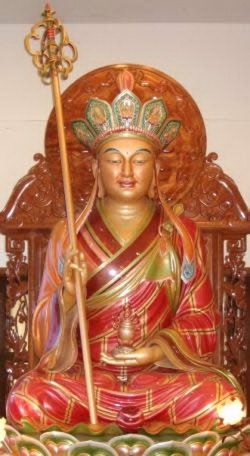Difference between revisions of "Flower Garland Sutra"
(Created page with "thumb|250px| <poem> Flower Garland Sutra [華厳経] (Skt Buddha-avatamsaka-nama-mahavaipulya-sutra; Chin Hua-yen-ching; Jpn Kegon-gyo ) Also known as ...") |
|||
| Line 1: | Line 1: | ||
[[File:Es27.jpg|thumb|250px|]] | [[File:Es27.jpg|thumb|250px|]] | ||
<poem> | <poem> | ||
| − | Flower Garland Sutra | + | [[Flower Garland Sutra]] |
| − | [華厳経] (Skt Buddha-avatamsaka-nama-mahavaipulya-sutra; Chin Hua-yen-ching; Jpn Kegon-gyo ) | + | [[[華厳経]]] (Skt Buddha-avatamsaka-nama-mahavaipulya-sutra; Chin Hua-yen-ching; Jpn Kegon-gyo ) |
| − | Also known as the Avatamsaka Sutra. The basic text of the Flower Garland (Chin Hua-yen; Jpn Kegon) school. According to this sutra, Shakyamuni expounded the teaching it contains immediately after he attained enlightenment under the bodhi tree in the kingdom of Magadha, India. Its full title is the Great and Vast Buddha Flower Garland Sutra. There are three Chinese translations: the sixty-volume sutra translated by Buddhabha-dra (359-429), the eighty-volume sutra by Shikshananda (652-710), and the forty-volume sutra by Prajna(b. 734). Prajna's translation consists only of the "Entering the Dharma Realm" chapter of the sutra. In the Flower Garland Sutra, Bodhisattva Dharma Wisdom and others teach other bodhisattvas of superior capacity that all things constantly interrelate and give rise to one another, that one permeates all and all are contained in one, and so on. The sutra also sets forth many stages of bodhisattva practice. | + | Also known as the [[Avatamsaka Sutra]]. The basic text of the [[Flower Garland]] ([[Chin Hua-yen]]; Jpn [[Kegon]]) school. According to this [[sutra]], [[Shakyamuni]] expounded the [[teaching]] it contains immediately after he attained [[enlightenment]] under the [[bodhi tree]] in the {{Wiki|kingdom}} of [[Magadha]], [[India]]. Its full title is the Great and Vast [[Buddha]] [[Flower Garland Sutra]]. There are three {{Wiki|Chinese}} translations: the sixty-volume [[sutra]] translated by Buddhabha-dra (359-429), the eighty-volume [[sutra]] by [[Shikshananda]] (652-710), and the forty-volume [[sutra]] by Prajna(b. 734). Prajna's translation consists only of the "[[Entering the Dharma Realm]]" chapter of the [[sutra]]. In the [[Flower Garland Sutra]], [[Bodhisattva]] [[Dharma Wisdom]] and others teach other [[bodhisattvas]] of {{Wiki|superior}} capacity that all things constantly interrelate and give rise to one another, that one permeates all and all are contained in one, and so on. The [[sutra]] also sets forth many stages of [[bodhisattva]] practice. |
</poem> | </poem> | ||
{{R}} | {{R}} | ||
Revision as of 16:37, 3 February 2014
Flower Garland Sutra
[[[華厳経]]] (Skt Buddha-avatamsaka-nama-mahavaipulya-sutra; Chin Hua-yen-ching; Jpn Kegon-gyo )
Also known as the Avatamsaka Sutra. The basic text of the Flower Garland (Chin Hua-yen; Jpn Kegon) school. According to this sutra, Shakyamuni expounded the teaching it contains immediately after he attained enlightenment under the bodhi tree in the kingdom of Magadha, India. Its full title is the Great and Vast Buddha Flower Garland Sutra. There are three Chinese translations: the sixty-volume sutra translated by Buddhabha-dra (359-429), the eighty-volume sutra by Shikshananda (652-710), and the forty-volume sutra by Prajna(b. 734). Prajna's translation consists only of the "Entering the Dharma Realm" chapter of the sutra. In the Flower Garland Sutra, Bodhisattva Dharma Wisdom and others teach other bodhisattvas of superior capacity that all things constantly interrelate and give rise to one another, that one permeates all and all are contained in one, and so on. The sutra also sets forth many stages of bodhisattva practice.
